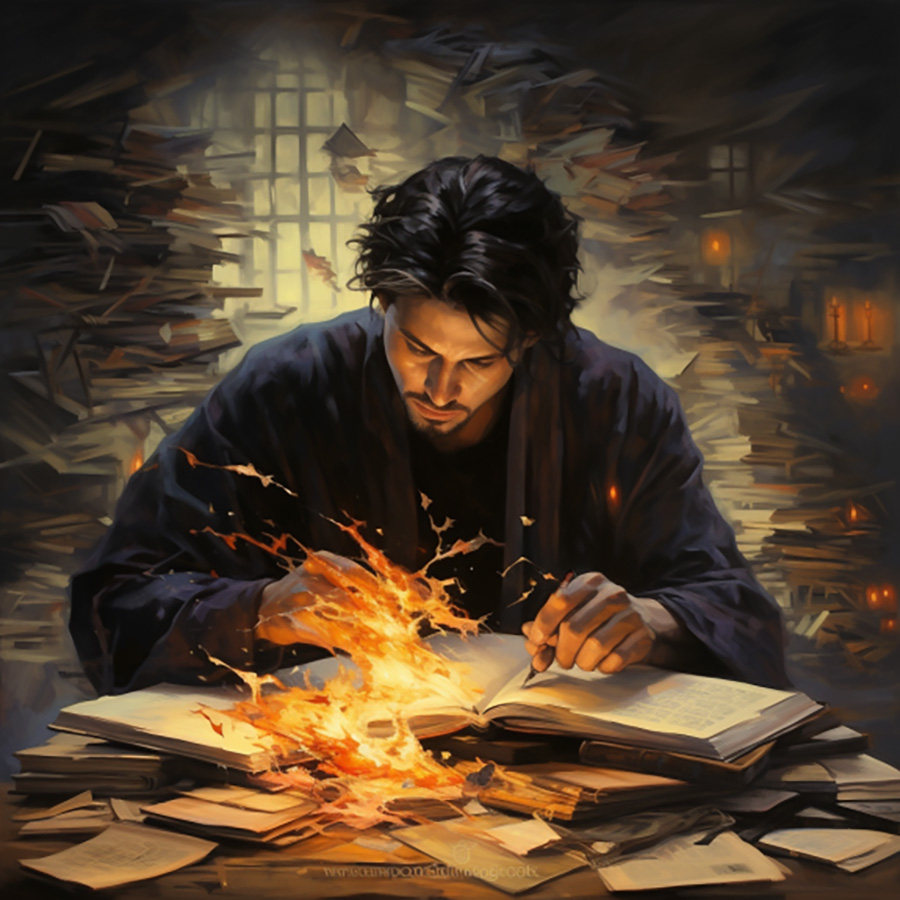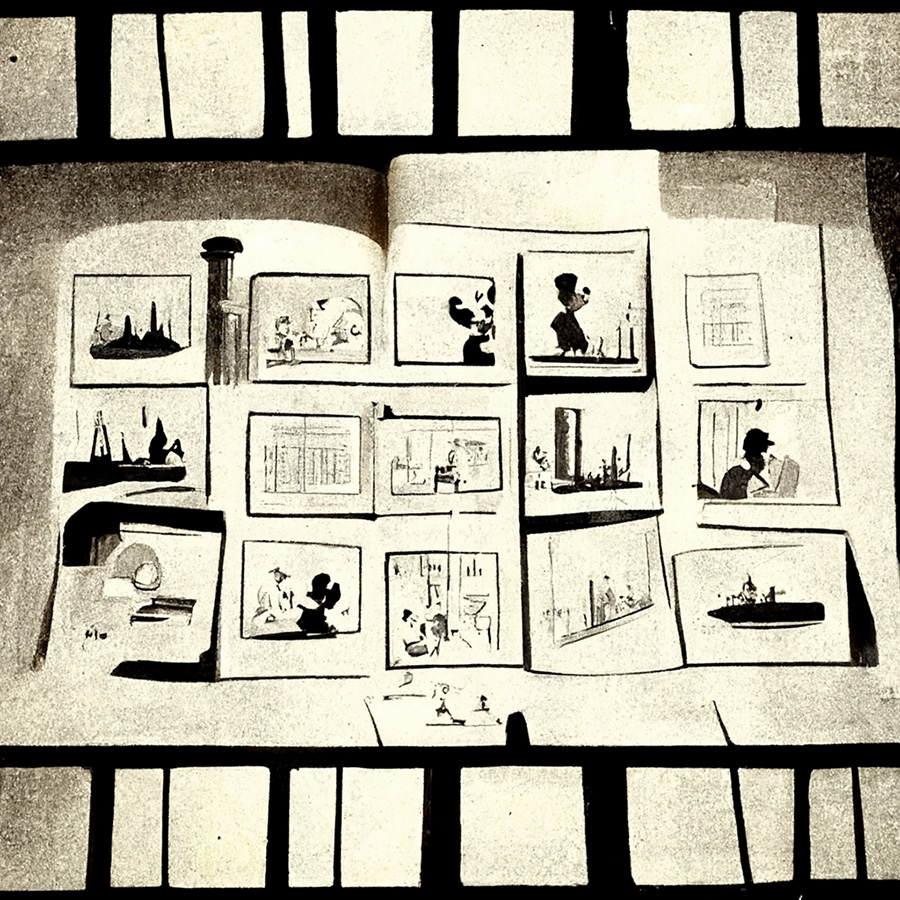I Agree With William Blake by Nonnie Augustine
|
|

I Agree with William Blake by Nonnie Augustine |
|
|
|
Big Plans by Nonnie Augustine

Jane was propped up on her elbows, eating a slice of pizza and trying not to get sauce on her friend's bed. Caroline, sitting at her computer with a slice in hand, complained yet again about submission guidelines.
"They all say the same thing. So boring. Twelve point type, no fancy fonts, word counts need not include the title, blah, blah, blah. Editors are all the same. I've discovered a brilliant font. I swear it's art in itself, but it's not one of their blessed regulars."
"Really? Did it come with that font software you bought? What's it called?"
"Yes, really. Yes, it did. And it's called 'Mondrian Whirl.' Totally cool. Here's my new poem printed in it."
'I Felt so Alone.'
"Hey, wasn't that the name of the last poem you wrote?"
"No-o. That was called, 'Loneliness is Misery."'
"Ah. My bad. But you do write about feeling lonely on Sundays in both, don't you?"
2008 Nonnie Augustine
|
Slightly Mushy Essay About Poetry and Peaches by Nonnie Augustine

"Do I dare to eat a peach?" is a line in the penultimate stanza of T.S. Eliot's "The Love Song of J. Alfred Prufrock." He wrote it sometime before 1920, when it was published; I read it sometime around 1973 ; it has lived with me ever since. The line comes up, you know? Along the way, as I've done this or that, it's surfaced, throughout my adult life-as have other bits from this or that poem, but I'd have to go on and on and on to talk about all of them, and we don't want that. No. Just Prufrock's peach. Why has it stuck with me is what I'm wondering about here.
Great peaches are messy, juicy, risky. Then there's the fuzz. What to do about that? Decisions abound. To peel? To cut? Is a knife at hand or will I have to ask for one? Maybe I should skip this fuzzy, juicy, delicious-looking peach. Eat something else… what to do? Do I dare? Well, I have. And have not.
I've messed up a lot of clothes, of course, and washed many dribbles off my chin. I've gone all out and been astonished. Sometimes I've done without, skipped the burst of flavor, the pleasure, because I've lacked nerve. Sure, I have. We all have.
I imagine T.S.'s line about J. Alfred's peach will continue to pop up as I move on in life, even if I'm not trying to get ahead with quite so much oomph. There's still risk-plenty of peaches to consider. I've had, and will have, poetry within easy reach, and some of it right there behind my eyes, between my ears, oh, hell, in my heart and soul.
So, when you write (when I write) it is (I tell myself) always worth trying to go for those phrases, lines, stanzas that might move right in with someone and stay for a lifetime. We never know, do we? The choices we make in meter, language, form can churn up a poem that will rock someone's world. It could happen. I wonder if Mr. Eliot had his Prufrock look over apples, mangoes, or muscadine grapes before he pondered daring to eat a peach? Eliot didn't write his poems for me, (I doubt he would have liked me, let alone written for me) but I have them, just as if he did. Writers are generous, aren't they? They put in all that time trying to get it right. They don't know if they'll be read, liked, paid. But they risk; they dare. I dare.
|
Prologue-Vampires, Ghosts, the Dead Returned by Yvette Managan

Vampires, ghosts, the dead returned, mad men - all these things our parents whispered to us, to entertain or warn us into obedience.
These were tools to settle restless children down into their beds. Does it matter that the little boy was scared stiff? His stillness was a welcome reprieve for his parent, and she'd warn,
"Stay still, mon petit, for what will happen if Loup Garou finds you?" or, "Go to bed now, Your babysitter will be here soon. His name is Freddy."
Who could sleep, but who could move? Maybe you pulled the blankets tighter over your head. Don't look under the bed and for goodness sake, don't even think about what might be in the closet.
We fretted from the safety of our parents protective arms, but there was always that fear -what if they were real? What if Mother and Father just didn't know the truth? Do you remember?
And every fall, that hint of danger in the air - the blustering wind, the sudden cold mornings-leaves changing colors and Halloween would soon be here, when the souls of all the people who' died during the last year, had their last chance to visit old friends, or torture old enemies. We, disguised, ran with them, a part of the fracas. We conquered our fears, dressed as all the monsters or haints that terrified us secretly in the dark. The girl in the mummy costume egged the boy dressed as Frankenstein. They laughed and shaving-creamed the house down the block, where no one ever answered the doorbell on Halloween night. You know the one. An old couple lived there, beneath falling rafters and behind that naked oak tree, whose limbs cast provocative shadows in the evenings. Where children crossed to the other side of the street to pass it by, except on Halloween night. Then it was payback time and the children, in guise, anonymous, protected from repercussions because, "It's Halloween!" toilet paperedhouses or shaving-creamed the doors. There was Ring and Run and burning bags of dog poop on doorsteps.
All that wildness helped us conquer our untamed hearts and fears. Still we thought maybe the Dracula at the door really is THE Dracula. One never knew. One had to be careful. ..
We grew up and learned that these were creations of our busy human minds. We gained mastery over our terror, but in doing so, lost that special flavor that added to our lives - that extra ginger and cinnamon in the pumpkin pie, the gold and red leaves among the dried brown ones, that skittered when we jumped in them. Remember hoping that a mole man wouldn't grab us and pull us under the earth?
We find hints of that fear, that spice-of-life, when we act recklessly. Sometimes we find it in horror movies. I prefer to be terrorized by the stories I read in after midnight. The call of the owl becomes an otherworldly beaconing and I draw the shades. The writings of others can make me squirm or check that the doors are secure. At this time of year, they often blow open. I hope it is the wind.
The Linnet's Wings presents this issue in the spirit of the season. Check the locks twice. Look under the bed and settle down for some good reading. I hope this issue leaves you somewhat ... uneasy.
2007 Yvette Managan/Flis
|
I'm convinced Micro & Flash are fiction's future by Ramon Collins
Perhaps the future is already here because it's the way people today like to read. More newspaper readers read the personal ads and the comics than read the editorials.
Is it shortened attention spans? It might be a Pavlovian "conditioned response" after four generations of TV idiots. It could be the effect of today's mad dash to nowhere. Whatever, the crafts are here to stay.
In four to eight thousand word short stories the writer has time to describe the living room curtains and what the protagonist's Aunt Maud from Wexford had for breakfast, but not in Micro or Flash fiction. The writer can imply we're in the house and that someone's in the kitchen. What the living room or Aunt Maud looks like is up to the involvement of the reader's imagination.
In my opinion, that's the key to the Micro & Flash crafts; "involvement". With the writer's skill at inference and implication the reader is invited to participate in the story -- to become an onlooker inside the story who asks the characters questions.
These are not television stories where you're spoonfed plot, settings, characters and dialog. Please participate and enter ...
2007 Ramon Collins
The Poetry Connection by Nonnie Augustine
My namesake, my Nonnie, was a dream grandmother. She knew every nursery rhyme, every silly song, and read from Robert Louise Stevenson's "A Child's Garden of Verses," with the same joy with which I would listen. She may not have been as good at other roles in life as she was as a grandmother, but because of Nonnie, I excelled in Mother Goose in Kindergarten, and poetry has been a life-long love.
Later, I taught Kindergarten myself. The children I taught were misfits-emotionally disturbed five-year-olds, who were wild, withdrawn, violent, and to a child, oppositional. When it was time to sing songs, listen to stories, and recite poems together, they were well-behaved, happy, content classmates, who liked each other and enjoyed their young lives, more than at any other time of day. Children don't have to be taught to love rhyme and metrical language. They are fascinated with ditties like, "Ride a cock horse to Banbury Cross to see a fine lady upon a white horse. With rings on her fingers and bells on her toes, she shall have music wherever she goes," long before the words convey meaning to them. Try it. Bounce a oneyear-old on your knee, with and without a spoken verse or song, and see the delight in the child's face when he or she hears magical, metrical rhyme.
"I will arise and go now, and go to Innisfree." Do Yeats' words speak to a longing in you? I'd guess yes, that they do. He didn't say, "I'll get up and go to Innisfree." The meaning is the same-but there is no poetry in the second version. It is not a magnificent line, as is the first. Oh, yes. Our gift is that we recognize the music of language, we are hard-wired to, and we have been all our lives. We can understand meaning through metaphor, or listen to "'Twas brillig, and the slithy toves/ Did gyre and gimble in the wabe:," and glean much more than nonsense from Lewis Carroll's words.
Good modem poets often eschew forms and rhyme schemes from other centuries, creating their own structures, scansions, and devices so that their words will reach, again in W.B. Yeats words, "the deep heart's core." Craft, insight, emotion are needed to drive poetry to that place within us, as much today as during any other period of our human history. When today's poets do use the frame of a sestina or a villanelle, fresh, relevant, language is needed to anchor the lines in modem minds and souls. Poetry isn't only for poets. It is an important part of our humanity. Ask a baby and you will see the proof. --Editorial 2007 (Inaugural Webzine)



